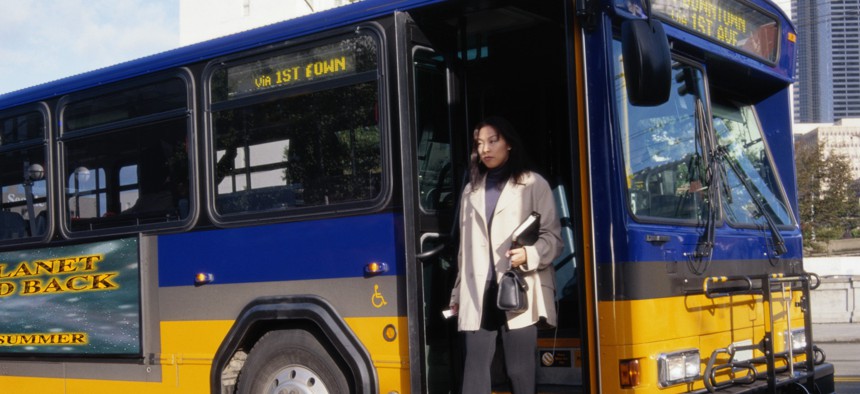Another City Expands Fare-Free Transit

John A. Rizzo via Getty Images
The Seattle program will provide no-cost bus passes for public housing residents.
Seattle is the latest local government to experiment with free bus fares, but the Pacific Northwest city is adding a new twist by focusing its efforts on residents of public housing.
Mayor Bruce Harrell said the move would provide free fare cards to 10,000 people for three years, at an annual cost of $2.2 million.
The city is using money from a sales tax hike that local voters approved in 2020, which originally went toward providing free fares for young people. But after Washington state lawmakers passed a statewide program for free youth fares, Seattle shifted its money toward public housing residents.
The new transit passes, Harrell said, help increase residents’ access to transportation and further the city’s environmental sustainability goals “through a simple—and proven—premise: Given increased access to free and affordable transit, neighbors will take advantage.”
The benefit for residents of the Seattle Housing Authority is the latest example of public officials expanding free fare programs both in the Seattle area and around the country.
In fact, Harrell told the Seattle Times that making transit free for everyone “should be our goal.”
The biggest move in that direction has been in Washington, D.C., where the city council approved a plan in December that will officially eliminate its $2 bus fares starting in July.
Kansas City, Missouri; Albuquerque, New Mexico; and Olympia, Washington already have rolled out free fares. Boston Mayor Michelle Wu campaigned on the slogan,“Free the T,” (a reference to the city’s transit system) and started a free fare program on limited routes.
Colorado’s state government also paid $28 million to make transit free there in August of last year, in an effort to reduce ozone pollution during the month it normally reaches its highest levels. Nine of the 14 local agencies that participated in the program saw higher ridership numbers even after the promotion ended than they did in the months before it started, according to The Colorado Sun.
The Seattle initiative for people living in public housing follows efforts by at least 17 major transit agencies to provide reduced fares for low-income residents.
In fact, Seattle provided nearly 2,000 public housing residents free fares under a pilot program that started in 2019, according to the mayor’s office.
Seattle also provided unlimited free fares during the early days of the pandemic for 2,200 people working in the food service and grocery industries in certain neighborhoods. The city transportation department said 91% of people who received those fare cards used transit more often than they had before getting the assistance.
Rod Brandon, the executive director of the Seattle Housing Authority, said in a statement that the passes for public housing residents would be a “tremendous improvement in safety, access to basic services, ability to get to jobs and overall quality of life for our residents.”
“Most of those we serve have to make difficult choices on how to spend limited budgets. Now they can get to jobs, school, medical appointments, the grocery store and other important activities without worrying about the cost,” he added.
Katie Wilson, the general secretary of the Transit Riders Union, a Seattle-area group that advocates for better public transit and transit accessibility, noted that there are many programs in the area designed to help low-income residents, but she said the idea of linking the free trips to affordable housing is “really fantastic.”
The approach makes administering the program easier, and it could make it easier for residents who, for example, lose a pass to show they qualify for the program. Wilson said she hopes Seattle officials consider expanding the program to people living in other affordable housing developments, not just those in public housing.
But Wilson said she appreciated the way local advocates and officials in the Seattle region have been slowly expanding free transit programs. They’ve been “fighting for these programs at various levels from local to county to state, and when there's an opportunity, you seize it,” she said. “Seattle has been really good at that in the last few years.”
Daniel C. Vock is a senior reporter for Route Fifty based in Washington, D.C.
NEXT STORY: New Boil Water Notices Are Being Issued Every Other Day in Jackson






